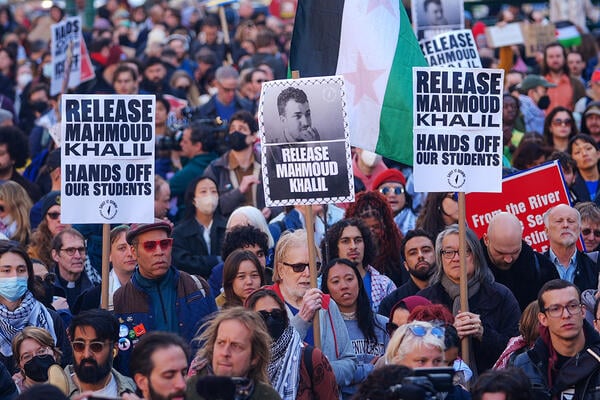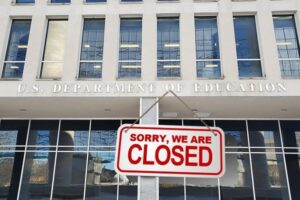
Judge Rules Campaign Against Noncitizen Protesters Unlawful
In a scathing decision published Tuesday, a federal judge ruled that two federal agencies led a campaign to detain and deport international students and faculty for pro-Palestinian speech with the goal of chilling further protests, violating the First Amendment.
“There was no ideological deportation policy,” wrote senior U.S. District Judge William G. Young, a Reagan appointee, in the 161-page ruling. “It was never the Secretaries’ [Marco Rubio, of the Department of State, and Kristi Noem, of the Department of Homeland Security] immediate intention to deport all pro-Palestinian non-citizens for that obvious First Amendment violation, that could have raised a major outcry. Rather, the intent of the Secretaries was more invidious—to target a few for speaking out and then use the full rigor of the Immigration and Nationality Act (in ways it had never been used before) to have them publicly deported with the goal of tamping down pro-Palestinian student protests and terrorizing similarly situated non-citizen (and other) pro-Palestinians into silence because their views were unwelcome.”
He also stated unequivocally that noncitizens in the U.S. have the same First Amendment rights as citizens—despite the Trump administration’s argument to the contrary during the trial.
The decision, which Young said may be the most important ever to fall within his district, comes about two months after the conclusion of a two-week trial in the case of American Association of University Professors v. Rubio, during which State Department and DHS employees explained that they had been tasked with identifying noncitizen pro-Palestinian activists to investigate and deport. Young wrote in his decision that the departments’ actions make it clear that they were working together to conduct targeted deportations with the goal of chilling speech—the repercussions of which are still being felt now.
The plaintiffs, which include the AAUP, three of its chapters—at Rutgers University, Harvard University and New York University—and the Middle East Studies Association, celebrated the win in a remote press conference Tuesday afternoon.
“That’s a really important victory and a really historic ruling that should have immediate implications for the Trump administration’s policies,” said Ramya Krishnan, the lead litigator on the case and a senior staff attorney at the Knight First Amendment Institute. “If the First Amendment means anything, it’s that the government cannot imprison you because it doesn’t like the speech that you have engaged in, and this decision is really welcome because it reaffirms that basic idea, which is foundational to our democracy.”
Still, despite the victory, several of the plaintiffs emphasized just how worrying the federal government’s crusade against pro-Palestinian noncitizen students and faculty is. Todd Wolfson, the president of the AAUP, said he believes those actions, as well as the federal government’s other attacks against academic freedom, are an even greater threat to higher education than McCarthyism was.
“The only equivalents might be the Red Scare and McCarthyism, but this is even worse, right? Because it’s not only attacking individual speech, it’s also attacking institutional independence and speech, right?” he said. “The Trump administration’s attacks on higher ed are the greatest assault on this sector that we have ever seen in the history of this country.”
So, What Comes Next?
Young previously separated this case into two phases, one focused on the government’s liability and the other on relief for the plaintiffs. According to Krishnan, the judge will schedule a later hearing to determine that relief. The plaintiffs hope Young will forbid the government from continuing to target noncitizens based on their political views, making permanent an injunction that the judge granted in March.
But Young noted in his ruling Tuesday that he is unsure what a remedy for the plaintiffs might look like in an era when the president consistently seems able to avoid recourse for unconstitutional acts.
“I fear President Trump believes the American people are so divided that today they will not stand up, fight for, and defend our most precious constitutional values so long as they are lulled into thinking their own personal interests are not affected,” he wrote, concluding the decision.
“Is he correct?”
Source link


